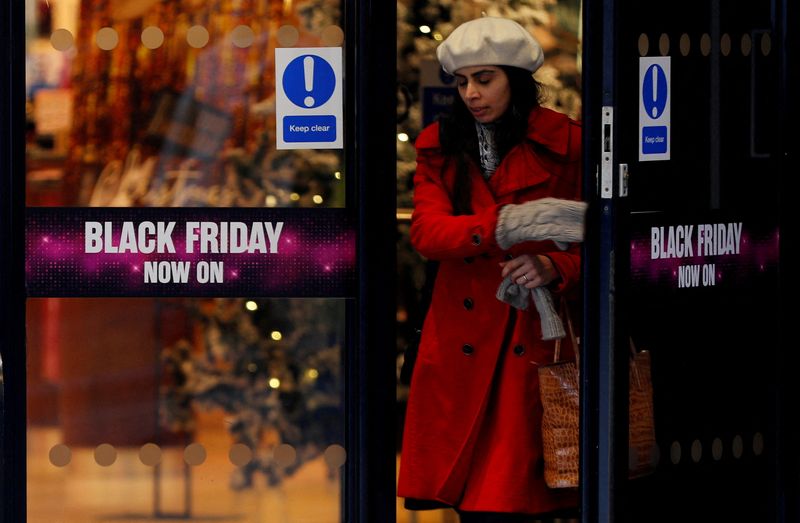Cost-of-living crisis casts shadow over Britain’s Black Friday
2022.11.25 02:27
[ad_1]

© Reuters. FILE PHOTO: A woman walks past a sign advertising Black Friday offers at a House of Fraser store in Manchester, Britain November 22 2019. REUTERS/Phil Noble
By James Davey
LONDON (Reuters) – Britain’s retailers are hoping Black Friday discount day will get shoppers spending, though it takes place against a backdrop of a worsening cost-of-living crisis and the distraction of the soccer World Cup.
Britons will spend 8.7 billion pounds ($10.5 billion) over the Black Friday weekend (Nov. 25 to Nov. 28), according to research by GlobalData for VoucherCodes – a rise of 0.8% year-on-year which masks a big drop in volumes once inflation is accounted for.
Consumers have been cutting back on their spending as soaring inflation – which hit a 41-year high of 11.1% in October – eats into disposable incomes. And they have begun their Christmas shopping early this year to help budget their finances.
This year, consumers will use Black Friday, which has become more of an online event, much more for jumping on spontaneous deals and for Christmas gifts, rather than for bigger, delayed purchases, according to consultants McKinsey.
Its research shows a quarter of UK consumers have already done their Christmas shopping, while about one in 10 is planning to do most of it during Black Friday.
Some consumers may, however, have other priorities, with both Wales and England in action on Friday at the World Cup.
Retailers across Europe fear the overall Christmas trading season could be the worst in at least a decade as shoppers cut back, while the costs of doing business show no sign of abating, squeezing profit margins.
HOLIDAY SALES
But many consumers still look set to shop Black Friday. Idealo, the European price comparison portal, said 65% of online Italian shoppers are ready to buy a product during the event.
In France, 70% plan to shop on Black Friday and Cyber Monday, according to research by PwC France.
However, the Spanish are less keen, with just 24% of shoppers planning to take advantage of Black Friday deals to get a head start on their Christmas shopping, according to the Spanish Association of Mass Consumer Goods Companies.
In the United States, the National Retail Federation (NRF) has forecast holiday sales would rise at a slower pace this year, while Amazon (NASDAQ:) has forecast its slowest revenue growth for any holiday period in years.
In Britain the Black Friday trading period is particularly important for the likes of department stores group John Lewis, consumer electricals retailers Currys and AO World, and general merchandise retailer Argos, which is part of supermarket group Sainsbury’s.
But some major retailers, including Marks & Spencer (OTC:), largely shun the event.
More than a decade since being brought to the UK by Amazon, Black Friday’s worth to retailers still divides opinion.
Supporters say carefully planned promotions in close co-operation with global suppliers allow retailers to boost sales and maintain profit margins.
Naysayers argue the discounts suck forward Christmas sales with reduced profits and undermine consumers’ willingness to pay full price again before the festivities.
($1 = 0.8262 pounds)
[ad_2]
Source link








